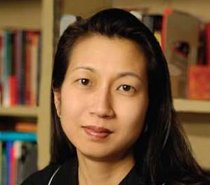
Division Head and Professor of Social Science
“Once I started my fieldwork, I realized that it was more than women entrepreneurs in southern Fujian who relied on informal finance -- China's entire private sector growth was being fueled by quasi-legal and often explicitly illegal forms of financing mechanisms.”
Kellee S. Tsai is Division Head and Professor of Social Science. Prior to joining HKUST, Professor Tsai served as Vice Dean for Humanities and Social Science and Professor of Political Science at Johns Hopkins University. A scholar of contemporary Chinese politics and economic development, Tsai’s research addresses broader debates in comparative politics, the political economy of development, and the study of informal institutions and endogenous institutional change. She is the author or co-author of three books, including Back-Alley Banking: Private Entrepreneurs in China (Cornell University Press, 2002), Rural Industrialization and Non-Governmental Finance in Wenzhou (co-authored in Chinese, 山西经济出版社 2004), and Capitalism without Democracy: The Private Sector in Contemporary China (Cornell University Press, 2007). She has co-edited a volume on Japan and China in the World Political Economy (Routledge, 2005), and her articles have appeared in journals such as China Journal, China Quarterly, Comparative Political Studies, Perspectives on Politics, World Development, and World Politics. Her current research concerns state capitalism in China; and the political economy of remittances and ethnic foreign direct investment in China and India.
“I started out as a stereotypical Asian-American who grew up in New Jersey, performed piano at Carnegie Recital Hall, and headed to college in New York as a pre-med. But I "rebelled" by majoring in political science and enrolling in a five-year BA/Master of International Affairs program at Columbia. My parents were relieved when I started working at Morgan Stanley as a Financial Analyst (apparent financial security!), but after a few years, I rebelled again by joining Women's World Banking, an international network of micro finance NGOs. (At Women's World Banking, I shared an office with Ann Dunham Soetoro, Barak Obama's mother. She had completed her PhD in anthropology as an older student, and introduced me to the marvels of conducting fieldwork). Although the experience of working in the field was exciting and took me to places like rural Kenya, I returned to graduate school to develop a broader analytic perspective on international development issues, and to conduct original field research in China. My original dissertation topic was narrow and reluctantly approved by my advisors: gender differences in the participation of rotating credit and savings associations in Fujian province. But once I started my fieldwork, I realized that it was more than women entrepreneurs in southern Fujian who relied on informal finance -- China's entire private sector growth was being fueled by quasi-legal and often explicitly illegal forms of financing mechanisms. My dissertation and first book, Back-Alley Banking: Private Entrepreneurs in China (Cornell University Press, 2002), tells that story.
My parents immigrated to the US from Taiwan in the late 1960s as graduate students. They eventually settled in New Jersey and still live there. I think they are bemused if not outright puzzled, by why their daughter would return to the region that they left. When I was a graduate student, they also had grave concerns about my security when I informed them that I would be conducting fieldwork in China.
I am married with two sons (who of course, study piano). We are all enjoying our new life in Hong Kong.”










